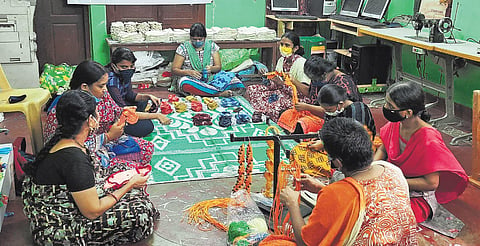

MADURAI: Workers are busy at Thiyagam Women’s Trust, tucked away in Nagamalai Pudukottai of Madurai. While one section stitches face masks, another makes doormats and gloves. Some sew night gowns for women, and others craft decor items. All of them are persons with disabilities (PwD) being trained to earn a living.
Started in 2005 by S Amuthashanthy, the trust aims to make disabled rural women economically independent. When Amuthashanthy was young, her parents admitted her to a home as she was born without a left hand. This had a huge impact on her mental health as a child.
“Though I excelled in academics, I was insecure because of my disability and would isolate myself. But my teacher saw my talent and encouraged me to participate in elocution competitions. This soon helped me step out of my shell. I won a State-level elocution competition and received a prize from the then chief minister MG Ramachadran,” Amuthashanthy said.
Started with tailoring unit at home, friends as colleagues
Amuthashanthy worked at various private institutions after completing her degree. In the holidays, she and her friends would go to villages to volunteer in helping disabled women. It was then that she realised she could start a tailoring unit for disabled persons.
In 1999, with Rs 30,000 in her bank account, Amuthashanthy quit her job and started a tailoring unit at the back of her house. “Meena, my friend, and I got on her cycle and went around Sellur in search of stitching orders. We approached about 10 shops but nobody was willing to give us an order, stating that the disabled can’t do ‘normal’ work. But we soon received an order for three dozen towels and no time to finish it. My friends and I got together and completed the task in a day. Our focus was only on the goal,” Amuthashanthy recalled.
Two years later, people came forward to sponsor tailoring machines, rental charges, and to also place orders; and in 2005, Thiyagam Women’s Trust was formed with the help of volunteers and the media.
Over the past 16 years, the trust has empowered more than 6,000 persons with disabilities across the State. Coordinator at the trust, S Meena, said, “When a person with disability is referred to us or comes seeking help, we first counsel and address them based on the issues they face. Then, we identify their skills and education level, and accordingly introduce them to higher education, sports, government schemes and the like.”
The residents at the facility are allocated work on the basis of skill and education. If a person cannot use their legs, they can stitch mats; if they are educated, they are trained in data entry. “Our aim is to rehabilitate and help them survive independently,” Meena said.
After the training, the parents or caregivers of the persons with disabilities are briefed and they are encouraged to set up a workspace at home. “Family members think the disabled are useless and the person too thinks they can’t do anything. Everyone has the potential to do something. We brief the parents and family members so that they realise it is also their responsibility to take care of and support them rather than have them idle at home,” Meena reiterates.
A home for new beginnings
The trust has helped breathe a new lease of life into the residents. Nancy Sahana (30), the warden of Thiyagam Stay Home was referred to the trust by the Collector after her friend cheated her of her money and abandoned her at the Government Rajaji Hospital. As she has passed Class 10 exams, she was made the warden and also takes care of logistics for the trust.
Besides the skills that Thiyagam teaches, the residents at the facility are skilled in dancing, singing, and mimicry, among other things.
Some sections of society get a raw deal, depriving them of proper education, exposure, and employment. But there’s hope even in the darkest of places. People ostracised and labelled useless have found ways to thrive. Here are a few of their stories